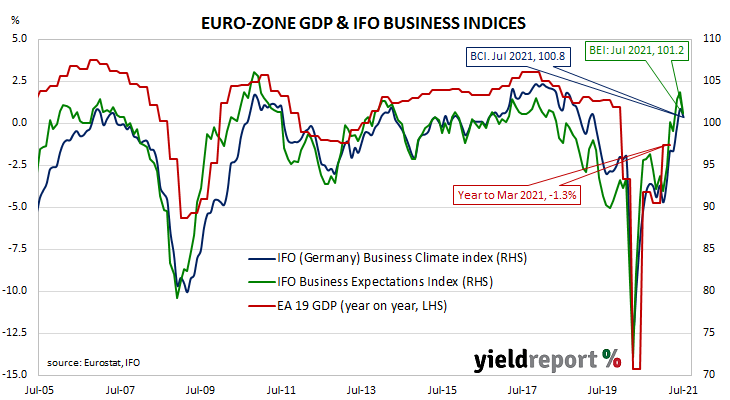Summary: ifo business climate index down in July, below expected figure; expectations, current conditions indices both down; companies “significantly less optimistic”, supply bottlenecks, infection numbers weighing; business climate index “still close to early 2019 levels”; expectations index implies 2.6% growth in year-to-October.
Following a recession in 2009/2010, the ifo Institute’s business climate index largely ignored the European debt-crisis of 2010-2012, remaining at average-to-elevated levels through to early-2020. However, the index was quick to react in the March 2020 survey, falling precipitously. The rebound which began in May of that year was almost as sharp but it was also characterised by a period of below-average readings which lasted until early 2021.
According to the latest figures released by the Institute, its business climate index declined to 100.8 in July. The reading was below the expected reading of 102.0 and 0.9 points below June’s final reading of 101.7. The average reading since January 2005 is just above 97.
“Companies evaluated their current business situations as somewhat better, but their expectations for the coming months were significantly less optimistic,” said Clemens Fuest, the president of the ifo Institute. “Supply bottlenecks and concerns over newly rising infection numbers are weighing on the German economy.”
The expectations index decreased from June’s revised figure of 103.7 to 101.2, also below the generally-expected figure of 103.6. The current situation index fell from 99.7 to 100.4.

German and French long-term bond yields both increased modestly on the day. By the close of business, the German 10-year yield had inched up 1bp to -0.41% and the French 10-year yield had gained 2bps to -0.07%.
ANZ economist Hayden Dimes noted the various headwinds but described the latest reading of the business climate index as “still in a relatively good spot, close to early 2019 levels.”

